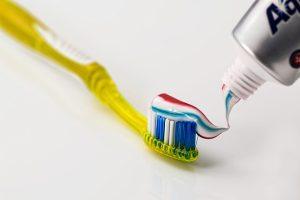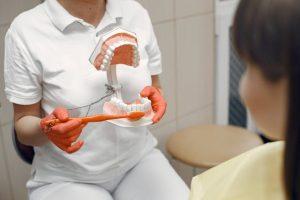Sensitive teeth can have such a detrimental impact on quality of life and mental health that it’s surprising how many patients choose to ignore symptoms and carry on.
There is no shortage of guides on what every patient should do available online, and yet the problem still remains a nationwide one. With this in mind, we thought it was about time we tried to approach things from a different angle.
This guide — while ultimately aimed at helping patients with sensitive teeth — is written to address practice managers directly.
Our hope is that if you are a practice manager reading this, you can bridge the gap between dentists and patients in a way that will make a real difference.
1. Desensitising Toothpaste

A private or NHS clinic that has a ready supply of pain-blocking toothpaste for sale at reception will be able to improve patient outcomes overnight. By having dentists highlight the need during an appointment and then having the reception team offer it on the way out, your practice can make a real difference to the formation of good habits.
2. Fluoride Treatments
The application of fluoride has been consistently shown to strengthen tooth enamel and protect the nerve endings in the highly sensitive pulp. The problem is that many patients are not aware of it, and many dentists are under too great a time pressure to spend time elaborating on options.
As the practice manager, you could take a proactive approach by asking the reception team to follow up with patients with sensitive teeth and offer these types of treatments. The result could be increased patient outcomes combined with a new revenue stream for the practice.
3. Choice of Toothbrush

Many people with sensitive teeth find that the simple act of brushing causes so much pain and discomfort that it is often easier to skip it and try again another day. The problem here is that when a habit is broken, it becomes much harder to restart than if you had simply continued. Because sensitive teeth cause brushing to become closely associated with intense pain, many people go weeks at a time without a thorough brush.
Practice managers who invest in a plentiful supply of soft-bristle toothbrushes and have the dental care team recommend them at the end of each appointment can readily address this issue. It just goes to show how a few small changes really can help bridge the gap between dentists and patients like never before.
4. Applying Dental Varnish
Practices will routinely offer deep cleaning and scaling to make sure that the teeth are optimally cleaned after an appointment. Dental care professionals who invest in additional options such as Profluorid Varnish, which is applied after professional tooth cleaning, can further improve oral health and hygiene.
Patients will be pleased to know that the varnish is clear, doesn’t affect taste, and protects the sensitive teeth beneath. If you, as the practice manager, encourage your dental care team to offer this service, the chances are that they will respond positively immediately.
5. Oral Health Education

So far, we have focused primarily on treatments and equipment you can add to your practice. The second stage is to focus on educating your patients by taking a more holistic approach to dental care and oral health.
Here are three things you may wish to consider presenting as ideas to the rest of the team:
- Dietary education can take the form of highlighting the need to cut back on sugar, citrus drinks, and smoking. If you can highlight the overall impact on the rest of the body — rather than focusing purely on the mouth — you will be able to make a compelling case that persuades a far greater number of patients
- The importance of rinsing is something many of your patients are simply not aware of, but they will likely be more than willing to add it to their daily routine if shown how. Something as simple as advising a saltwater rinse can help to protect the teeth in a natural way.
- Identifying patients who grind their teeth at night and experience too much sensitivity, as a result, is also important. Advising that they consider fitting a mouthguard is something that may help you get to the bottom of more complex cases
If you are a dental patient reading this, we sincerely hope that you have found our ideas and advice helpful. If you are a practice manager or dental care professional, we know from experience just what a difference you can make. Start by connecting with a specialist dental equipment and consumables supplier with nationwide reach, and you’ll be able to start helping and educating your patients the smart way.






























